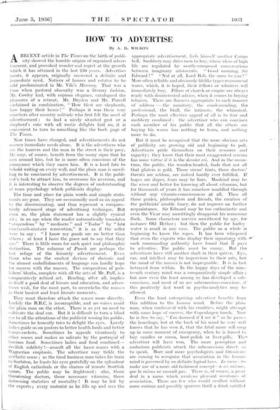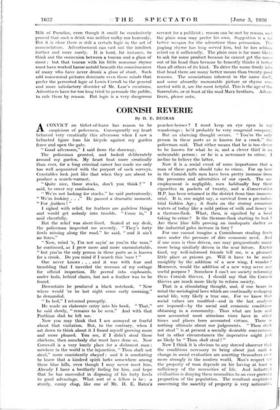HOW TO ADVERTISE
By A. D. WILSON ARECENT article in The Times on the birth of publi- city showed the humble origins of organised adver- tisement, and provoked wonder and regret at the growth which it has attained in the last 250 years. Advertise- ments, it appears, originally answered a definite and immediate need. Notices of houses and estates to be sold predominated in Mr. Vile's Mercury. That was a time When pastoral obscurity was a literary fashion. Mr. Cowley had, With Opious elegance, catalogued the pleasures of a retreat. Mr. Dryden and Mr. Purcell exclaimed in- combination, "How blest are shepherds, how happy their lasses !" Perhaps it was these very searchers after country solitude who first felt the need of advertisement ; to find a nicely situated grot or a shepherd's cote with all rustic delights laid on, it is convenient to turn to something like the back page of The Times.
Now times have changed, and advertisements do not answer immediate needs alone. It is the advertisers who are the hunters and the man in the street is their prey. lie may, of course, benefit from the many signs that he sees around him, but he is more often conscious of the annoyance which they cause him. It is a hard fate to behold writing on every wall, and the plain man is unwil- ling to be convinced by advertisement. It is the publi- eist's task to attract him, to overcome his aversion, and it is interesting to observe the degrees of understanding of mass psychology which publicists display.
The time and place for plain words and simple state- ments are gone. They are occasionally used as an appeal to the discriminating,' and thus represent a compara- tively advanced stage of advertising technique. But even so, the plain statement has a slightly cynical air ; in an age when the reader automatically translates "stupendous" by " mediocre " and "Tudor" by " late nineteenth-century renovation," it is as if the seller were to say : "I know my goods are no better than others ; at least I have the grace not to say that they are." There is little room for such quiet and philosophic distinction. The columns of Punch are perhaps the last refuge of the leisurely advertisement. Even those who use the crudest devices of rhetoric and I he utmost embellishments of language can hardly hope for success with the masses. The composition of pub- lishers' blurbs, complete with all the arts of Mr. Puff, is ,a comparatively refined art. Reading, after all, implies in itself a good deal of leisure and education, and adver- tisers wish, for the most part, to overwhelm the masses in their busiest and least literate moments.
They must therefore attack the senses more directly. Luckily the B.B.C. is incorruptible,- and no voices assail the plain man on the ether. There is as yet no need to cultivate the deaf car. But it is difficult to turn a blind eye to all the attentions of the publicist wooing his public. Sometimes he honestly tries to delight the eyes. Lovely ladies guide us on posters to better health foods and better tennis-rackets. Sometimes he appeals vicariously to other senses and makes us salivate by the portrayal of luscious food. Sometimes ladies and food combined— devilish subtlety !—assault all the baser senses with 'a Wagnerian emphasis. The advertiser may tickle the aesthetic sense ; as the tired business man takes his train to Surbiton, he feasts his eyes gratefully on the splendour of English cathedrals or the charms of remote Scottish moors. The public may be frightened ; alas, those threatening doctors, those necessary vitamins, those distressing statistics of mortality I It may be led by the experts ; every motorist as he fills up and sees the appropriate advertisement, feels himself another Camp- . bell. Snobbery may drive men to buy, whose ideas of high life are regulated by neatly-composed conversations between imaginary aristocrats. " Good morning, Sir Edward !" "Not at all, Lord Bob, the same to ■-ou !"
More often reliable and obviously lifelike types recommend wares, which, it is hoped, their fellows or admirers will immediately buy. Pillars of church or empire arc always ready with disinterested advice, when it comes to buying tobacco. There are fluences appropriate to each manner of address — the monitory, the condescending, the professional, the bluff, the intimate, the whimsical. Perhaps the most effective appeal of all is to fear and snobbery combined : the advertiser who can convince each member of his public that all the others are buying his wares has nothing to learn, and nothing more to do.
But it must be recognised that the more obvious arts of publicity arc growing old and beginning to pall. Advertisers pride themselves on their resource and sagacity; they know that their most exaggerated scream has some virtue if it is the dcrnier cri. And in the men- time, the public, the wooden-headed, finds that not all that glisters is gold. Those sirens' hints, those doctors' threats arc seldom, are indeed hardly ever fulfilled. If hopes arc dupes, fears may be liars. Mankind may be the wiser and better for knowing all about vitamins, but for thousands of years it has somehow muddled through without any vitamin-consciousness at all. Then all those guides, philosophers and friends, the creation of the publicists' nimble fancy, do not improve on further acquaintance. Sir Edward may be too enthusiastic and even the Vicar may unwittingly disappoint his numerous flock. Some characters survive unwithered by age, for instance Old nether; but then the public for barley water is small in any case. The public as a whole is • beginning to know the ropes. It has been whispered that even the experts who display their signature with er such commanding authority have found that it pays to advertise. The public must be canny. But the advertisers have still another shaft in their quiver. Eye, car, and intellect may be impervious to their arts, but the mind of the masses is not impregnable. It is in fact betrayed from within. In the happy days of the nine- teenth century mind was a comparatively simple affair ; but now even the least among us has developed a sub- conscious, and most of us arc subconscious-conscious, if this positively last word in psycho-analytics may be allowed.
Even the least enterprising advertiser benefits from this addition to the human mind. Before the plain man, when confronted with his crudities, might attempt with some hope of success, the Copenhagen touch. Now he is free to say, " I'm damned if I see it " as he passes the hoardings, but at the back of his mind he very well knows that he has seen it, that the fatal name will crop up in some moment of emergency, when he is forced to buy candles or cocoa, boot-polish or liver-pills. Tio, advertiser will have won. The more perceptive and audacious publicists attack the subconscious direct, so to speak. More and more psychologists and Wien:lc:ow are coming to recognise that association in the human mind is governed by no definite logical laws. Lc coeur—to make use of a more old-fashioned concept—a scs raisouN, que la raison ne connait pas. There is, of course, a great deal in a name which awakens pleasant overtones of association. There are few who would swallow without some curious and possibly spurious thrill a drink entitled Milk of Paradise, even though it could be conclusively proved that such a drink was neither milky nor heavenly. But it is clear there is still a certain logic in the art of nomenclature. Advertisement can cast out the intellect further and more surely. It is hard, for instance, to think out the connexion between a toucan and a glass of stout ; but that toucan with his little nonsense rhyme must have worked havoc untold beneath the consciousness of many who have never drunk a glass or stout. Such odd nonsensical pictures dominate even those minds that prefer the perverted logic of Lewis Carroll to the general and more satisfactory disorder of Mr. Lear's creations. Advertisers have for too long tried to persuade the public, to rule them by reason. But logic is a very dangerous servant for a publicist ; reason can be met by reason, and the plain man may prefer his own. Suggestion is a far better weapon for the advertiser than persuasion;. The jingling rhyme has long served him, but he has seldom relied on it sufficiently. The plain man is far more likely to ask for some product because he cannot get the name out of his head than because he honestly thinks it better than all others of its kind. To drive the name firmly into that head there are many better means than twenty good reasons. The associations inherent in the 'name itself, and some absurdly memorable picture or rhythe con- nected with it, are the most helpful. This is the age of the Surrealists, or at least of the mad Marx brothers. Adver- tisers, please note.















































 Previous page
Previous page